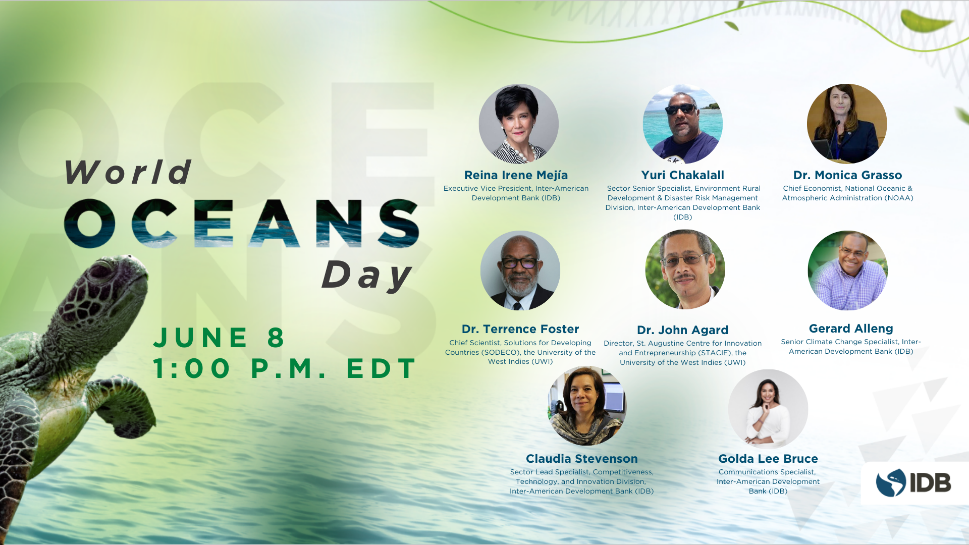On June 8th, the IDB Group held its celebration of World Oceans Day by hosting the event Promoting the Blue Economy in Latin America and the Caribbean. The space brought together key leaders and experts to discuss the importance of safeguarding the health and productivity of the oceans to achieve sustainable development, climate action, and economic recovery in the region.

1. The ocean is important to us, we should not ignore its value
In Latin America and the Caribbean, more than 25% of our population lives on the coast and depends on ocean resources for food, transportation, energy, recreation, scientific research, and socio-cultural connections. Additionally, the blue economy of the Caribbean region represents about 17% of the region’s GDP.
The value of the global blue economy is estimated to be around US$1.5 trillion per year, with assets such as fisheries, productive coastlines, and shipping. Still, it also includes emerging non-traditional resources such as carbon sequestration and biotechnology. As a result, global numbers are expected to increase, with a projected doubling of the ocean economy and the potential employment of over 40 million people by 2030. This is to be expected as there is and will be a growing demand for ocean resources and the need to continue addressing the impacts of climate change.
2. The ocean’s value is under threat
The health and productivity of our blue natural capital are under heavy pressure from several factors, including unsustainable fishing practices, improper waste management, plastic pollution, and invasive species disrupting ecosystem balance. Other contributing factors are environmental degradation, loss of coastal and marine ecosystems, as well as increased ocean acidification and increased sea surface temperatures because of climate change.
3. There is a way to manage the threat: Utilize the blue economy
- Integrated Coastal Zone Management (ICZM) can provide lessons and experience to guide the governance of the contemporary blue economy development agenda. ICZM offers a governance approach that has proven successful in scaling up the management of offshore blue space.
- Understanding the state of the blue economy can support decision-makers and investors in tracking industries to understand the best policy and financing options. To sustain the blue economy, efforts to understand its boundaries and contributions must be scaled up. Special attention must be given to emerging and non-traditional sectors such as biotechnology, marine pharmaceutics, and shipping.
- Nature-based solutions are a great alternative to leverage the potential of ecosystems to thrive in the blue economy. Multi-disciplinary scientific evidence-based and community-based approaches are critical to understanding the drivers of blue economy assets, their degradation and potential solutions.
- Innovation and technology should play a predominant role in mainstreaming the blue economy. Global trends such as the Blue Tech and the incorporation of blue financial mechanisms are already a reality in our region. Continued efforts should ensure that stakeholders from the public and private sectors have the conditions to implement these actions.
The IDB is committed to the sustainable management of our ocean resources
The IDB is actively promoting the Blue Economy as a key element to address climate change and biodiversity challenges and boost economic opportunities and social inclusion for local communities. This approach aligns with Vision 2025, our blueprint to accelerate a sustainable and inclusive post-pandemic recovery.
Initiatives such as the Blue Economy Policy-based Guarantee in the Bahamas, the mangrove restoration project in Jamaica, and the issuance of the first blue bond in Latin America and the Caribbean represent a fraction of what the Bank is doing to advance the blue economy in the region.
Ocean resources are a key driver for fostering regional integration, innovation, and economic diversification. They are also a vehicle to accelerate inclusion, especially for women and vulnerable groups. Women in our region are already showing great leadership in the ocean space.
The momentum to seize the opportunities our oceans provide is here, and the IDB is committed to helping accelerate the blue economy to become a key driver in transitioning to an inclusive, low-carbon, and resilient future.
As our Executive Vice-President Reina Irene Mejía stated,
“Let us celebrate this day by working together in unity towards a new economic, environmental and social pact that balances the use of our oceans while supporting their health and productivity in accordance with sustainable principles and practices.”
Visit sustainableislands.iadb.org.


Leave a Reply